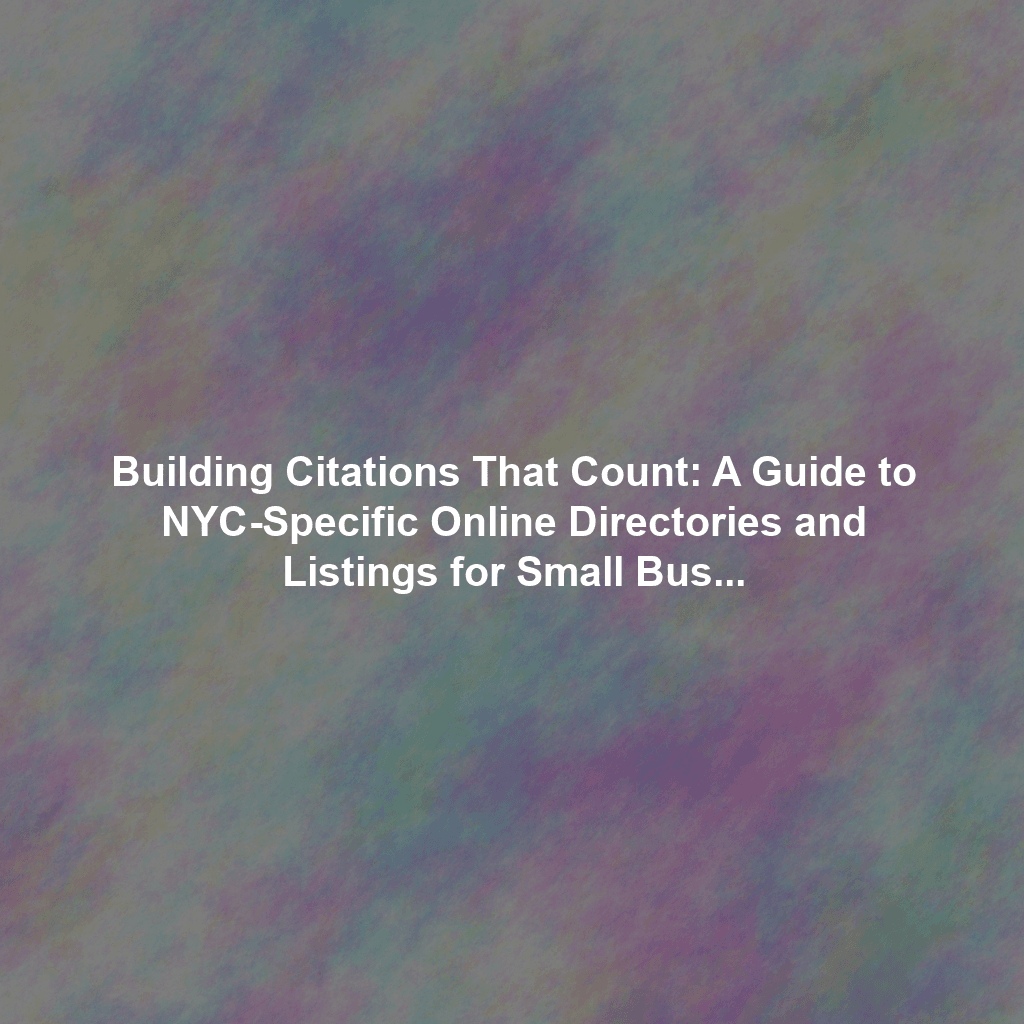Navigating the bustling, hyper-competitive landscape of New York City as a small business owner is no easy feat. Every block, every neighborhood, pulsates with countless other businesses, all fiercely vying for the attention of the same discerning customers. While having an exceptional product or service is, without question, the bedrock of your enterprise, getting found online is not merely important; it is an existential imperative. This is where the strategic power of local SEO comes into play, and within the intricate web of local search optimization, local citations stand as an absolutely foundational element. Think of them as the digital breadcrumbs you scatter across the internet – consistent, verifiable online mentions of your business’s core information that help search engines like Google not only verify your legitimacy but also significantly boost your local search ranking. They are the silent, constant endorsements that tell the digital world, “This business is real, it’s here, and it’s relevant.” This comprehensive guide dives deep into the strategic world of local citations, specifically tailored for small businesses operating in the unique, vibrant, and incredibly competitive environment of New York City. We’ll explore precisely why they matter, which directories are truly worth your valuable time, and how to meticulously ensure your business information is accurate, consistent, and pervasive across the vast expanse of the web. It’s about turning online mentions into real-world foot traffic.
Why Local Citations are Essential for NYC Businesses: Your Digital GPS
In the hyper-local, densely populated world of NYC, where consumers often search for businesses “near me” or “in [specific neighborhood],” citations act like crucial digital breadcrumbs, guiding potential customers (and crucially, Google’s algorithms) right to your doorstep. They are a direct signal of your physical presence and relevance. Here’s why they’re so vitally important for any business aiming to thrive in the five boroughs:
- Improved Local Search Ranking: Citations are a significant ranking factor for local search results. The more high-quality, relevant, and consistent citations you have across authoritative online directories, the higher you’re likely to rank in Google’s local pack (the map results) and organic local searches. Imagine a tourist searching for “best pizza in Brooklyn” or a resident looking for a “plumber near me in Manhattan” – strong citations ensure your business appears prominently. Google uses these mentions to cross-reference and validate your business’s existence and location.
- Increased Visibility Beyond Google: Citations help your business get found on a multitude of platforms beyond just Google Search and Maps. When your business is accurately listed in directories like Yelp, Foursquare, TripAdvisor, or even niche industry-specific sites, it gains exposure to a wider, often highly engaged, audience who might use these platforms as their primary search tool. This diversifies your online footprint.
- Building Trust and Authority: A consistent and accurate presence across numerous reputable online directories signals to Google (and, equally important, to potential customers) that your business is legitimate, active, and trustworthy. Inconsistent or missing information can raise red flags, making your business seem less credible. Think of it as digital word-of-mouth endorsement from established platforms.
- Driving Website Traffic and Direct Calls: Many directories allow you to include a direct link to your website, providing a valuable source of referral traffic. Furthermore, a prominent, accurate phone number on these listings means potential customers can call you directly with a single tap from their mobile device, leading to immediate inquiries and conversions.
- Enhanced Brand Awareness and Recognition: Consistent mentions of your brand name, services, and location across the web contribute significantly to overall brand awareness and recognition within your target geographic area. Even if a customer doesn’t click immediately, repeated exposure to your brand on different platforms builds familiarity and recall for future needs.
- Competitive Advantage: In a city as competitive as NYC, every advantage counts. Businesses that prioritize and meticulously manage their local citations will often outrank competitors who neglect this fundamental aspect of local SEO. It’s a relatively low-cost, high-impact strategy.
For more on how Google uses business information, refer to Google Business Profile Help.
NYC-Specific Online Directories: Your Citation Goldmine in the Big Apple
While generic, high-authority directories like Yelp, Yellow Pages, and Facebook are universally important for any business, focusing on directories specific to New York City and your particular industry can provide a significant, targeted boost to your local SEO efforts. These niche platforms often carry more weight with local search algorithms and connect you with highly relevant audiences. Here are some high-authority, NYC-centric options to consider, along with tips for finding even more:
General NYC Business Directories: The Must-Haves
- NYC.gov Small Business Services Directory: This is an absolute non-negotiable must-have! Being listed on the official city government website carries immense authority and trust with search engines. It signals ultimate legitimacy. Navigate to the “Small Business Services” section of NYC.gov to find their business directory.
- Chamber of Commerce Websites: Joining your local Chamber of Commerce (e.g., Manhattan Chamber of Commerce, Brooklyn Chamber of Commerce, Queens Chamber, Bronx Chamber, Staten Island Chamber) and getting listed in their member directory can be highly beneficial. These are trusted local institutions.
- Local Business Improvement Districts (BIDs): Many vibrant NYC neighborhoods have their own BIDs (e.g., Downtown Brooklyn Partnership, Flatiron NoMad Partnership). These organizations often maintain online directories featuring businesses within their specific district. Being listed here connects you directly with hyper-local searchers.
- NYC Tourism & Visitor Guides: Websites like NYCgo.com (the official tourism guide) often have business listings for various categories (restaurants, attractions, shops).
- Local News & Media Outlets: Many NYC-based news organizations (e.g., Time Out New York, The Village Voice, local community newspapers) have “best of” lists or business directories.
Niche Directories and Listings: Targeting Your Specific Audience
Beyond general directories, dive into platforms that cater specifically to your industry or a particular interest group. These often yield highly qualified leads.
- Restaurants & Food Services: Beyond Yelp and Google, consider specialized directories like Eater NY, The Infatuation, and neighborhood-specific food blogs (e.g., “Greenpoint Foodie,” “Upper West Side Eats”). OpenTable is crucial for reservations.
- Retail & Boutiques: Look for directories specializing in local boutiques, vintage shops, artisan goods, or specific fashion segments. Websites like “Shop Small NYC” or local fashion blogs can be valuable.
- Service Providers (Plumbers, Electricians, HVAC, etc.): Check directories like Angi (formerly Angie’s List), Thumbtack, HomeAdvisor, and local trade association websites.
- Arts & Culture: For galleries, theaters, music venues, or cultural organizations, NYC Arts, Time Out New York’s arts section, and specific museum/gallery guides are excellent resources.
- Real Estate: For real estate agents and brokers, StreetEasy, CityRealty, and the websites of local real estate boards are crucial.
- Health & Wellness: Directories like Zocdoc (for medical professionals), Mindbody (for fitness studios), and local wellness blogs.
Tips for Finding More Relevant Directories: Becoming a Citation Detective
- Google Search Power: Use highly specific search terms. Examples: “[Your Industry] directory NYC,” “[Your Neighborhood] businesses list,” “best [Your Service] in [NYC Borough],” or “local [Your Product] shops New York.”
- Competitor Research (Reverse Engineering): This is a golden strategy. Use tools like Semrush, Ahrefs, or Moz Local (or even just manual Google searches) to see where your top-ranking local competitors are listed. Make sure you’re also included on those platforms, and then look for additional opportunities they might have missed.
- Industry Publications and Associations: Many industry-specific publications, trade journals, or professional associations have online directories or resource lists for their members or the public.
- Local Bloggers and Influencers: See which local bloggers, influencers, or community websites are featuring businesses like yours. They often link to local directories or have their own curated lists.
- “Best Of” Lists: Search for “best [your business type] in NYC” or “top [your service] in [neighborhood]” to find articles and lists that often include links to businesses and their associated directories.
NAP Consistency: The Cornerstone of Citation Success and Trust
While the sheer quantity of citations is important, the quality and, most critically, the consistency of your business information across all your online listings are paramount. NAP stands for Name, Address, and Phone number – these three pieces of core information about your business must be absolutely identical and accurate across every single online listing, from your Google Business Profile to the smallest niche directory. This consistency is the bedrock of local SEO trust.
Why NAP Consistency Matters: Avoiding Digital Confusion
- Search Engine Accuracy and Trust: Inconsistent NAP information is a major red flag for search engines. If Google sees different addresses or phone numbers for the same business, it creates confusion, making it harder for the algorithm to confidently rank your business. This inconsistency can negatively impact your ranking and even lead to your business being excluded from local packs.
- Seamless Customer Experience: Inaccurate or inconsistent information leads directly to frustrated customers who can’t find your business, call the wrong number, or show up at an old address. This results in lost business, negative reviews, and a damaged reputation. A seamless customer journey starts with accurate information.
- Reputation Management: Inconsistent information erodes trust in your business. If a potential customer sees conflicting details, they might question your professionalism or even your legitimacy. Trust is built on reliability, and consistent NAP is a key component of that.
- Improved User Signals: When users find consistent information, they have a better experience, which sends positive signals back to search engines, further reinforcing your business’s authority.
Tips for Maintaining NAP Consistency: Your Master Data Strategy
- Establish a Consistent Format: Before you start, decide on an exact, canonical format for your business name, address, and phone number, and stick to it rigidly across all platforms. For example:
- Name: “My Business Name LLC” (not “My Business Name, LLC” or “My Business Name”)
- Address: “123 Main Street, Suite 4B, New York, NY 10001” (not “123 Main St, Ste 4B, NYC, NY 10001”)
- Phone: “(212) 555-1212” (not “212-555-1212” or “212.555.1212”)
Even minor discrepancies can be problematic.
- Create a Centralized NAP Document: Maintain a single, authoritative document (e.g., a Google Sheet, a simple text file) with your official, consistent NAP information. Use this as your absolute reference point whenever creating a new listing or auditing existing ones.
- Regularly Audit Your Citations: Periodically (e.g., quarterly or semi-annually) check your existing citations across the web to ensure they are accurate and up-to-date. This is especially crucial after any business changes (address move, phone number change, rebranding).
- Claim and Verify Your Listings: Wherever possible, claim and verify your listings on platforms like Google Business Profile, Yelp, and other major directories. Claiming gives you direct control over your business information and allows you to respond to reviews.
- Utilize Citation Management Tools: For larger businesses or those with many listings, consider using a citation management tool (e.g., Moz Local, BrightLocal, Yext). These tools can automate the process of creating, updating, and monitoring your citations across hundreds of directories, saving significant time and reducing errors.
- Remove Duplicate Listings: Actively seek out and remove any duplicate listings for your business. Duplicates confuse search engines and dilute your authority.
For more detailed guidance on NAP consistency, consult resources like Moz’s guide on Local Citations.
Beyond the Basics: Optimizing Your Citations for Maximum Impact
While accurate and consistent NAP information is the essential foundation, you can go beyond mere listing to truly optimize your citations and significantly enhance your local SEO performance and customer appeal. These additional elements transform a simple listing into a powerful marketing asset.
- Add a Compelling Business Description: Don’t leave the description field blank! Include a compelling, keyword-rich, and concise description of your business, highlighting your unique selling propositions and what sets you apart. Use relevant keywords that potential customers might search for.
- Choose Relevant Categories Meticulously: In each directory, choose the most accurate and specific categories for your business. For example, instead of just “Restaurant,” choose “Italian Restaurant” or “Vegan Cafe.” The more precise your categories, the better search engines can match you with relevant queries.
- Include High-Quality Photos and Videos: Visual content dramatically increases engagement and trust. Upload high-resolution photos of your storefront, interior, products, and team. If the directory supports it, include short videos. Visuals make your listings more engaging, informative, and inviting, helping customers visualize your business.
- Encourage and Respond to Customer Reviews: Positive customer reviews are a massive ranking factor for local SEO and are crucial for building trust with potential customers. Actively encourage satisfied customers to leave reviews on platforms like Google Business Profile and Yelp. More importantly, respond to all reviews (positive and negative) professionally and promptly. This shows you value customer feedback and are engaged.
- Add Business Hours: Always include your accurate and up-to-date business hours. This is vital for customer convenience and prevents wasted trips, leading to a better customer experience.
- List Payment Methods: Clearly state the payment methods you accept (e.g., credit cards, mobile payments). This can be a deciding factor for some customers.
- Link to Your Social Media Profiles: If the directory allows, link to your active social media profiles. This further expands your digital footprint and provides more avenues for customers to connect with your brand.
Common Pitfalls and How to Avoid Them: Navigating the Citation Minefield
While building citations is straightforward in principle, several common mistakes can undermine your efforts and even harm your local SEO. Being aware of these pitfalls is key to a successful strategy:
- Ignoring Duplicate Listings: One of the most damaging issues. Multiple, conflicting listings for the same business confuse search engines and dilute your authority. Regularly audit for and actively work to remove or merge duplicates.
- Inconsistent NAP Data (Again!): This cannot be stressed enough. Even minor variations (e.g., “St.” vs. “Street,” different suite numbers) can cause problems. Maintain your master NAP document religiously.
- Neglecting Review Management: Simply getting reviews isn’t enough. Failing to respond to reviews (both positive and negative) shows a lack of engagement and can deter potential customers.
- “Spamming” Directories: Don’t just list your business on every single directory you can find, especially low-quality, irrelevant ones. Focus on authoritative, relevant platforms. Quantity without quality can be detrimental.
- Outdated Information: Business hours change, phone numbers update, services evolve. Failing to keep your citations current means customers get incorrect information, leading to frustration and lost business.
- Not Claiming Listings: Leaving your business listings unclaimed means you have no control over the information, making you vulnerable to incorrect data or even malicious edits.
- Ignoring Mobile Optimization: Many directory users are on mobile. Ensure your listings look good and are easy to navigate on smartphones.
The Ongoing Process of Citation Management: A Continuous Investment
Building and maintaining accurate local citations is not a one-time task; it’s an ongoing, continuous process that requires consistent effort and vigilance. The digital landscape is dynamic, and your business information can become outdated or inconsistent over time due to various factors:
- Business Changes: Any change to your business name, address, phone number, or even business hours requires an immediate update across all your citations.
- New Directories Emerge: The online directory landscape evolves. New, relevant platforms may emerge that you’ll want to be listed on.
- Data Aggregators: Large data aggregators (like Factual, Infogroup, Neustar Localeze) feed information to hundreds of smaller directories. Ensuring your data is correct with these aggregators is crucial, as they can propagate errors if your information is inconsistent.
- Competitor Activity: Your competitors are likely working on their citations. Continuous management ensures you maintain your competitive edge.
- Review Management: Actively managing reviews is an ongoing part of citation management.
Conclusion: Take Control of Your Local SEO with Strategic Citations
In the vibrant, intensely competitive New York City marketplace, simply existing is not enough; you must be discoverable. Building and meticulously maintaining accurate local citations is an ongoing, yet incredibly worthwhile, investment for any small business in NYC looking to significantly improve its local search ranking and consistently attract more customers. By strategically focusing on high-authority, NYC-specific directories, ensuring unwavering NAP consistency across all platforms, and actively optimizing your listings with rich content and proactive review management, you can take decisive control of your local SEO destiny. This isn’t just about getting found; it’s about making your business stand out, building indelible trust, and converting online visibility into tangible, real-world foot traffic and revenue. Don’t be afraid to explore new, relevant directories and, crucially, commit to keeping your information updated. Your diligent efforts will pay off exponentially in increased visibility, a surge in website traffic, and ultimately, a thriving customer base that finds you precisely when they need you most. Make your business the undeniable local choice.
 Skip to content
Skip to content

